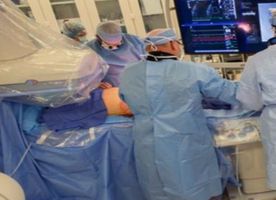Cardiology in South Korea
Search and Compare the Best Clinics and Doctors at the Lowest Prices for Cardiology in South Korea
Gachon University Gil Medical Center





Cardiology at Gachon University Gil Medical Center in Incheon, South Korea
Incheon St. Mary's Hospital





Cardiology at Incheon St. Mary's Hospital in Incheon, South Korea
Samsung Medical Center





Cardiology at Samsung Medical Center in Seoul, South Korea
Dongguk University Ilsan Medical Center





Cardiology at Dongguk University Ilsan Medical Center in Ilsan, South Korea
Inje University Ilsan Paik Hospital





Cardiology at Inje University Ilsan Paik Hospital in Goyang, South Korea
Dongtan Sacred Heart Hospital
Gangnam Severance Hospital





Cardiology at Gangnam Severance Hospital in Seoul, South Korea
Hallym University Medical Center
Kangdong Sacred Heart Hospital
Hallym University Sacred Heart Hospital
Hangang Sacred Heart Hospital
Chung-Ang University Hospital





Cardiology at Chung-Ang University Hospital in Seoul, South Korea
Sun Medical Center





Cardiology at Sun Medical Center in Daejeon, South Korea
Hanyang University Medical Center





Cardiology at Hanyang University Medical Center in Seoul, South Korea
Cheil General Hospital & Women's Healthcare Center





Cardiology at Cheil General Hospital & Women's Healthcare Center in Seoul, South Korea
Kyung Hee University Hospital





Cardiology at Kyung Hee University Hospital in Seoul, South Korea
Seoul National University Hospital





Cardiology at Seoul National University Hospital in Seoul, South Korea
Severance Hospital





Cardiology at Severance Hospital in Seoul, South Korea
Nanoori hospital





Cardiology at Nanoori hospital in Seoul, South Korea
JK Plastic





Cardiology at JK Plastic in Seoul, South Korea
Our partner clinics in South Korea are accredited by the following associations



































































































































No Time?
Tell us what you're looking for and we'll reach out to the top clinics all at once
WHY US?



































































































































No Time?
Tell us what you're looking for and we'll reach out to the top clinics all at once












Cardiology is a branch of medicine concerned with disorders of the heart. It is the study, diagnosis, prevention, and treatment of such conditions as heart failure, coronary artery disease, congenital heart defects, and much more. Doctors who specialize in this branch of internal medicine are known as a cardiologist.
What Does Cardiology Involve?
Cardiology involves tests, including electrocardiogram to record the electrical activity of the heart, exercise test to see the changes of heart rhythm, echocardiogram that provides an ultrasound picture showing the structure of the heart, and cardiac catheterization to collect data and help relieve a blockage. There are numerous different treatments within cardiology for various different heart disorders, such as valvuloplasties, angioplasties, stenting, congenital heart defect corrections, as well as coronary thrombectomies. Nearly all treatments for heart diseases are major surgery and are performed under general anesthetic.
How Long Should You Stay in South Korea?
Your length of stay in South Korea depends on which procedure you underwent. In general, you need to stay in the hospital for several days and also to stay in the country for an additional fourteen days or until your cardiologist allows you to travel home.
How Long is the Recovery Time?
The recovery period can be different from one person to another, depending on your overall health and any complications. You should expect to progressively regain your energy and go back to your normal activity level in about four to eight weeks after treatment, particularly following surgical treatments.
What Aftercare Should You Consider?
You may need to attend regular follow-up appointments, either with your cardiologist in South Korea or in your home country. You must make some lifestyle adjustments after you recover, including eat a healthy diet, exercise regularly, stop smoking, and limit your alcohol intake, to prevent future heart disease or complications. Your cardiologist may recommend you to get a cardiac rehabilitation, which will improve your health after treatment and help you recover after surgery.
What is the Success Rate for Cardiology?
Generally, the success rate depends on the specific procedure and your specific condition. Cardiology has helped millions of people around the world and if performed by experts, the risk of serious complications is very low. However, just like any other treatment, there are some risks to be aware of, such as bleeding, stroke, heart rhythm problems, blood clots, infection, valve dysfunction, and death.
Are there Alternatives to Cardiology?
Those who suffer from heart disorders do not have any other alternatives besides going to a cardiologist. However, if you do not want to undergo surgery or take any medication, you need to talk to your surgeon for the best alternative for your specific case.
What Should You Expect Before and After the Procedure?
Disorders of the heart can be dangerous, life-threatening, cause painful symptoms, and interfere with your ability to perform daily activities. After you have been treated by a cardiologist, you may be cured of your disease and your symptoms are relieved.
This information has been accurately sourced and verified by a medical professional for its accuracy, however, we strongly recommend you to consult with your doctor before pursuing medical procedures overseas.























